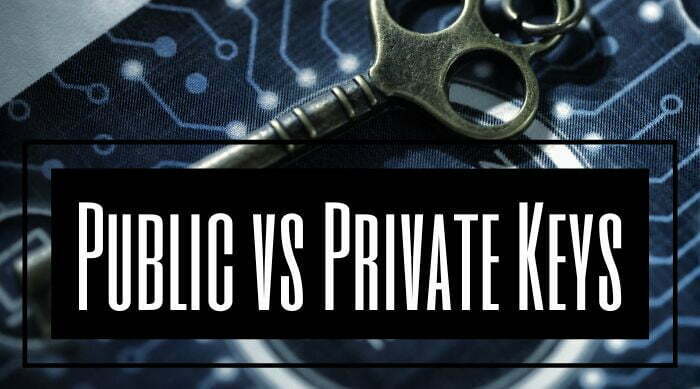When you buy cryptocurrency or NFTs you must send funds in exchange for the virtual currency. You need public keys and private crypto keys to do this. You use your private key to access your own cryptocurrency, and you use the public key to send funds to the seller.
You have the option to store your keys on an exchange, write them down and save a physical copy of them, or transfer your keys to a digital wallet.

The importance of public keys and private keys for cryptocurrency can’t be understated. If you are new to crypto, the first thing you will learn about is the need to protect them both and why they are important. These keys are necessary for buying, selling, and trading crypto. You literally cannot function in the space without them
Public vs Private Keys
Public and private keys are part of something called the Public Key Cryptography framework or PKC. Some sources describe your public and private keys as a pair. They are meant to fit together and work together, but only one key is intended to be shared, the other must be kept a secret. But why?
Private Crypto Keys
Having a private key is identical to having a debit card with a PIN number or passphrase. If you find an ATM card and know its PIN, you may have access to all the funds in that account. Losing a private key is the same issue–lose the key and your entire digital wallet or online account may be compromised.
The private key is a bit like your house key. Give your house key away to the wrong third party and you may come home to find your home is empty. Give your private crypto key away and you can expect similar results with your account or digital wallet.
How To Use Your Private Key
While it is true that public and private keys are meant to function as a unit, that does NOT mean you should or are expected to send your private key to anyone else. How do you use it? When you sell crypto or NFTs to someone else, they will send you the public key to their coins.
You use your private crypto key to unlock the transaction and accept the payment. You do NOT send your private key to a seller or service provider to do this.
Private keys can take a number of different forms. They may be in the form of a long binary or hexadecimal code, a QR code may be used instead, or you may be given a phrase to remember as your private key.
When considering the use of a private key, remember that if someone else sends you crypto or NFTs, you need your private key to unlock them. Without using your private key, the assets remain locked.
How To Use A Public Key
It is not unsafe to post or distribute a public key. If you wanted to raise money for a class project and solicited cryptocurrency by posting a public key, that is basically the “mailing address” for the funds.
You don’t worry about posting this key because you need your private key to unlock any funds you earned during the fundraiser. Nobody else has your private key, so in theory no one else can access the money sent to the public address.
Your public key can also be used to verify your identity. When you accept Bitcoin as payment, for example, the Bitcoin is stored on the blockchain with a record of your transaction. Someone can take your public key to look up that transaction on the blockchain to verify that you are the true owner of that currency.
That is part of the transparency of the blockchain. Your private key is not stored on the blockchain.
What To Know About Public And Private Keys
There is no central governing authority governing or recording crypto keys. If you lose a private key, you effectively lose whatever that key unlocks. It’s like losing the key to a bicycle lock, except where crypto is concerned there is no bolt cutter to simply remove the lock and reclaim your property.
In fact, no brute force techniques are likely to succeed in getting your crypto back if you lose the private key. The key is so unique and important that many users consider double and triple redundancy to protect them. Writing all your keys down as well as storing them in a digital wallet, for example. It definitely pays to be a bit paranoid about your private keys. Once they are gone, they’re usually gone for good.
Joe Wallace has covered real estate and financial topics, including crypto and NFTs since 1995. His work has appeared on Veteran.com, The Pentagon Channel, ABC and many print and online publications. Joe is a 13-year veteran of the United States Air Force and a former reporter for Air Force Television News.


